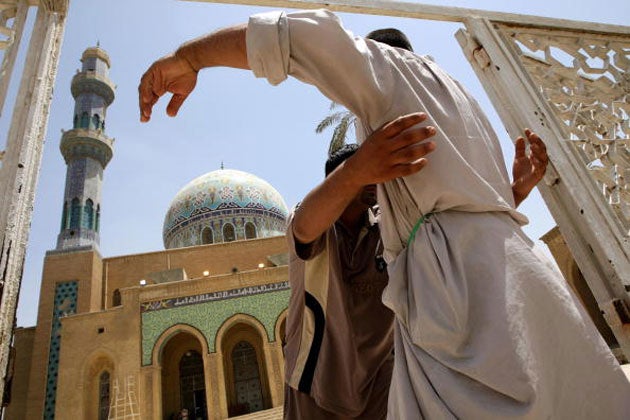Female bombers kill scores of Iraqi pilgrims

Four female bombers have detonated explosives in the middle of crowds in Baghdad and Kirkuk, killing at least 57 people and wounding 300 in a double attack apparently geared towards stoking increased sectarian and ethnic divisions.
Three of the suicide bombers blew themselves up among Shia pilgrims as they took part in a religious procession in Karada district in east Baghdad, killing 32 people and wounding 102. Most of the dead were women and children. "I heard women and children crying and shouting and I saw the dead bodies of women in pools of blood on the street," said Mustapha Abdullah, a 32-year-old man who was injured in the stomach and legs.
In the northern oil city of Kirkuk, thousands of Kurds were demonstrating against a provincial elections law when a suicide bomber struck, killing at least 25 people and wounding 185. Kurds then attacked offices of the political parties of the Turkoman minority, although it is likely that al-Qa'ida in Iraq was behind the attack.
Women are used as suicide bombers because there are rigorous searches of men by the Iraqi security forces in an attempt to stop attacks. But inhibitions over searching women, often wearing voluminous black robes, and a shortage of female security personnel, makes it easier for them to reach targets without being searched.
One of the female bombers blew herself up outside the old National Theatre building in Karada. The second attack was in a tent provided so pilgrims could rest. A woman allegedly entered the tent, read the Koran with other women and then left, leaving a bag behind, which later exploded. The third bomber detonated an explosive vest. Nails from the device could be seen embedded between two police checkpoints.
The Shia pilgrims were commemorating the death of an eighth-century saint who is buried in the al-Khadamiyah district in north west Baghdad, but they were attacked on the other side of the Tigris river while they were still assembling. Processions and pilgrimages play a central role in the religious beliefs of the Shia denomination. Around 60 per cent of Iraqis are Shia, but they are denounced by al-Qa'ida as heretics. It is almost impossible to protect them during pilgrimages to their shrines, when up to one million will gather.
The attack in Kirkuk is also geared towards increasing ethnic animosities, since power in the city is disputed by the Kurds, Arabs and Turkomans. The Kurds took over in 2003 after the fall of Saddam Hussein and would like to incorporate the city into the autonomous Kurdistan Regional Government – but this is opposed by Arabs and Turkomans.
The Iraqi President, Jalal Talabani, last week vetoed an election law which would have postponed the poll in Kirkuk but also diluted Kurdish control. Kurdish protesters claimed that they had been fired on from Turkoman offices, but this was denied by the security forces, who said the only shooting was when they fired into the air to clear the way for ambulances.
Join our commenting forum
Join thought-provoking conversations, follow other Independent readers and see their replies
Comments